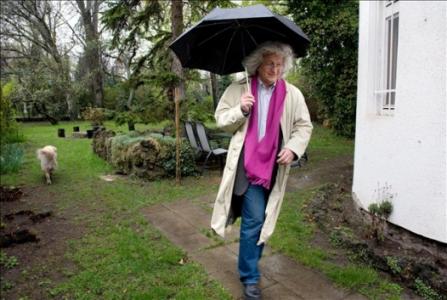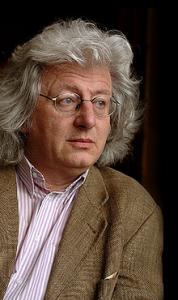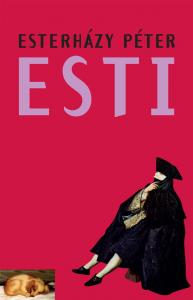Evening Question
Does Péter Esterházy read reviews of his works? What does he think when he's labeled 'literary writer'?
He does. I think everybody does, even if they say they don't. I sometimes don't pay attention when reading them. And when Javított kiadás was released, I think there were some mean reviews. I stopped reading them after the 'auftakt' and checked them only much later.
There are all kinds of labels. It shows a hastily formed opinion. Kosztolányi was labeled a literary writer too, wasn't he? It can't be that bad then. If being a literary writer means only writing for literateurs then it's nonsense. If it means that literature itself plays a bigger role than usual then it's a true commonplace. It doesn't seem to be such an important label after all."
A couple of examples from Mottókollekció: "What an ugly craft this is." (Kosztolányi). "Write, don't whine." (Danilo Kiš) What is Péter Esterházy's literary motto? And what does writing mean to Péter Esterházy? Is it a way of introspection too? Self-reflection? Retreat? Or are these words too big?
Yes, they are, although I can only answer in big words too. Writing is my life. I can't separate them. I didn't plan it this way but it doesn't matter now. I thought I'd have more time outside my study. On the other hand, that is where I feel best (not considering the trivial options of course). Perhaps writing is self-reflection and a retreat, but I don't think of it this way. Or it doesn't interest me this way.
I collected mottos in Bevezetés too. Most of them would fit well, like 'Write, don't whine.' or 'Oh how many flaws I would have if I didn't write.' by Flaubert. I don't have a motto. At the most, there are mottos that could be mine. I had one on my wall once, from a Mándy interview. The interviewer mentioned that Mándy had a new car, a Renault R4, and Mándy replied 'So it's an R?" I viewed this as my motto for a while, partly as an expression of innocence, partly because you need to be really distant to be present or to at least be able to say something about being here. 'So it's an R?' I try not to forget that.

How does Péter Esterházy write? Does he have a daily minimum, or does he only work when the muse kisses him?
A bureaucratic minimum, yes (not quantity, time). The muse sometimes kisses, sometimes it doesn't. I'm afraid it only does if you have a daily minimum set.
'A possible me', 'a possible life'. Can you imagine your life without literature, writing and reading?
No. Or maybe, being a chef. I knew everything about food, otherwise being a grunt. Although you need a sense of form too. But I wouldn't know anything about Goethe – nor myself. But people would still come to me from Szentes to taste my tripe with trotters. And my filled lobster.
Kosztolányi on Kornél Esti: "To desribe inside out who or what he was to me would be adifficult task." What does the map to the relationship maze of Kosztolányi - Kornél Esti - Esti - Esterházy look like?
To describe that would be a difficult task. I couldn't add anything of value to what has been already written about this. I can't take anything away from it either. It's either a map or a maze anyway. I'd be surprised if anyone could reveal everything about a text.

Regardless of the author, all next works have to take the burden of the previous books. In Esti's case, it is the Esterházy books on the one hand and the works of Kosztolányi on the other. Did you take this into account while writing Esti?
You don't need to take it into account. If it's a burden, you feel it. Here, I had the same difficulties as with Harmónia, that it is so obvious. It's ment for me. This is serious pressure. But there's always something. If an object is too near, that's a problem. If it's too far away then that's the problem. If it's neither near nor far, or there is no object, that's a problem too. And when for some mysterious reason there's no problem, you create one, and then you have a problem.
If Kosztolányi lived, what would you two talk about? How about Kornél Esti?
I'd absolutely mix them up (see 'To desribe inside out who or what...') and we'd have a pleasant friendly chat. I think I'd ask him about the country, particularly about patriotism. Patriotism and form. Oh and Radákovich too. And what would I say? I would thank them.
In Esti, alteregos, forms of speech appear and disappear instead of characters. The text is text, it emphasizes its artificial origin. This method widens literature – we all become alteregos. The figures weaved from our associations and our lives are born inside our heads. Was this your goal?
Well... No I didn't have this in mind. As always, I just wanted the reader to be involved, so that the book is about them a bit too. It doesn't matter if it happens through identifying themselves with the protagonist (in case there is one), a character, the story, fate, lovability, or the way you describe it. It's all the same. The writer has to address the reader somehow. This is the goal.
Esti has never talked as much as when he returned from Moscow. It wasn't the quantity really, but the soul, the zest, the colour with which he talked. He seemed to be hiding something. If I wanted to joke, I'd say he had been hiding his life. Or this joke is his life, to be earnest. It is clear that the end (this?) is his life." In his "biographical (re)interpretation of Kornél Esti", Mihály Szegedy-Maszák refers to facing death in regards to the book. Are you 'coming from Moscow' with Esti?
To be honest, I don't understand the question. Does death come from Moscow? If I had written it when I wrote Kis magyar pronográfia, this would be probalbly true, a legitimate association. Sure I use the word 'death' more frequently than when I was thirty. Even I die in the end... Who would've thought...?"

István Margócsy's review in ÉS reads: "Esti accounts for the hardships, proprieties, simplicity and complexity of writing prose." Perhaps this is where the undefinability of the genre originates. Small prose mosaic? Phrases? Diary entries? Novel? How would you label this work?
I don't know. I don't really care. I mean, I myself won't gain anything by knowing. But I believe it certainly is no novel or a diary entry. Phrases is not enough, small prose mosaic doesn't say anything, although maybe that's what it is. A string of thoughts, maybe. I'd say (perhaps) it's the same genre as Kosztolányi's Kornél Esti book."
"It would be good to live a bit longer." But how? What's Péter Esterházy's ideal day like?
I think the quote refers to just living, it doesn't matter how. Freedom and love, I need these two I need [sic]. And freedom means work. Or the monastic labour with friends added. Although I think right now I'm dreaming about the optimal day, the possible best. The impossible best, I'd like that. But that wouldn't be a 'day'. Well, until it turns out, I'll just do my job. Doesn't matter how.
Esti, the title of Esterházy's book, is also the name of a hero of the Hungarian novelist, Dezső Kosztolányi, and means evening in Hungarian.



Facebook-hozzászólások